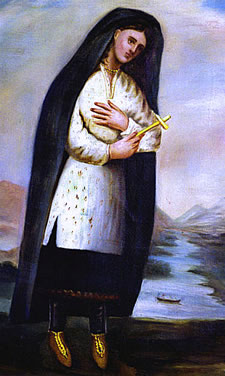Kateri
 As you might have seen in all the local coverage, Kateri Tekakwitha -- a Native American woman born near Amsterdam, New York in 1656 (there's now a shrine at the site) -- was canonized by the Roman Catholic Church Sunday. She's the first Native American to be recognized as a saint by the church. Thousands of people were at the shrine in Auriesville to celebrate.
As you might have seen in all the local coverage, Kateri Tekakwitha -- a Native American woman born near Amsterdam, New York in 1656 (there's now a shrine at the site) -- was canonized by the Roman Catholic Church Sunday. She's the first Native American to be recognized as a saint by the church. Thousands of people were at the shrine in Auriesville to celebrate.
Sainthood is a big deal for Catholics. Saints are believed to have led lives of great faith, often in difficult circumstances. (In Kateri's case: converting to Catholicism, taking a vow of chastity, and becoming a paragon of faith after being left an orphan by smallpox and living through turbulent times.) And Catholics believe that God continues to act through these people after their deaths. (In Kateri's case: a boy in Washington State is said to have been cured of a flesh-eating infection after prayer to her.)
Local author Jack Casey was in Rome for the canonization of Kateri and he's written a series of posts about the experience on his blog. A book by Casey -- Kateri -- Lily of the Mohawks -- was recently published by Staff Picks Press, the imprint run by the Book House. It sounds like an overview of Kateri's story -- or, at least, a version of it.
Not surprisingly, the canonization of Kateri has reportedly prompted a range of reactions among Native Americans. From an interesting recent article by Renée K. Gadoua in the Syracuse Post-Standard:
"We've been waiting a long time for this," [Sister Kateri Mitchell, born on the St. Regis Mohawk Reservation] said of the canonization at the Vatican on Sunday. "It's a great validation."
Doug George-Kanentiio, also a Mohawk from St. Regis, was brought up Catholic, even serving as an altar boy. But he left the church at 14 when he began to practice longhouse traditions.
"I had a lot of anger at the church at the things they had done to the Native people and the world and the moral compromises they made," he said.
He, too, will travel to Rome for the canonization.
"It took me a while to begin to adopt a different approach to this, not one based on history, but compassion for a young woman who was determined she was going to emulate the suffering of Jesus Christ," George-Kanentiio said. "That passion is remarkable."
Alicia Cook grew up on the Onondaga Nation, married a Mohawk and now lives at St. Regis, also known as Akwesasne. She has always practiced longhouse religion and has no interest in Kateri's story.
"The church has been telling us for years we're heathens," Cook said. "The white man has hurt us enough. They intruded on our land here."
And here's another perspective, from a site called American Indians in Children's Literature, lamenting the stereotypes that have popped up in coverage of Kateri.
portrait by Father Claude Chauchetière, S.J., ca 1696 via Wikipedia
Hi there. Comments have been closed for this item. Still have something to say? Contact us.
Comments
A great meditation on Kateri Tekakwitha (although not one that the Holy See would endorse) can be found in Leonard Cohen's great novel, "Beautiful Losers".
... said Jason on Oct 22, 2012 at 2:54 PM | link
Much as I'd like to applaud this on the grounds of cultural diversity, I can't. You lose me at the requirement for two "documented" miracles to gain sainthood, no matter how exemplary and holy the life..
... said chrisck (former Catholic, current skeptic) on Oct 22, 2012 at 3:47 PM | link
Please.
See Carl Strock's great article (Schenectady Gazette - 12/22/11) on what actually happened concerning this 'miracle'. Like most of the fantasy of religion, it falls quite apart when the facts are revealed.
C.
... said ChuckD on Oct 22, 2012 at 7:24 PM | link
I couldn't find the Carl Strock article, but I'm guessing he mentioned the miracle of the boy who was saved by divine intercession plus a few dozen surgeries. I'm always amazed when I read these articles that they don't catch the irony of a young woman who was blinded and scarred by smallpox being admired for leading an exemplary, chaste life, or how they bring up the antipathy held against Jesuit missionaries when it was they who brought the smallpox in the first place!
Still, it's bringing some attention and tourism to the area, so I'm not complaining.
... said Tim on Oct 22, 2012 at 8:45 PM | link